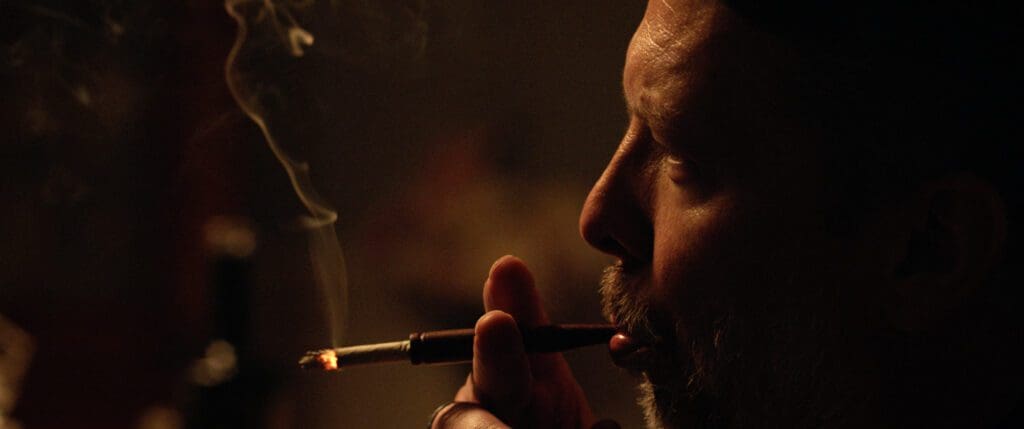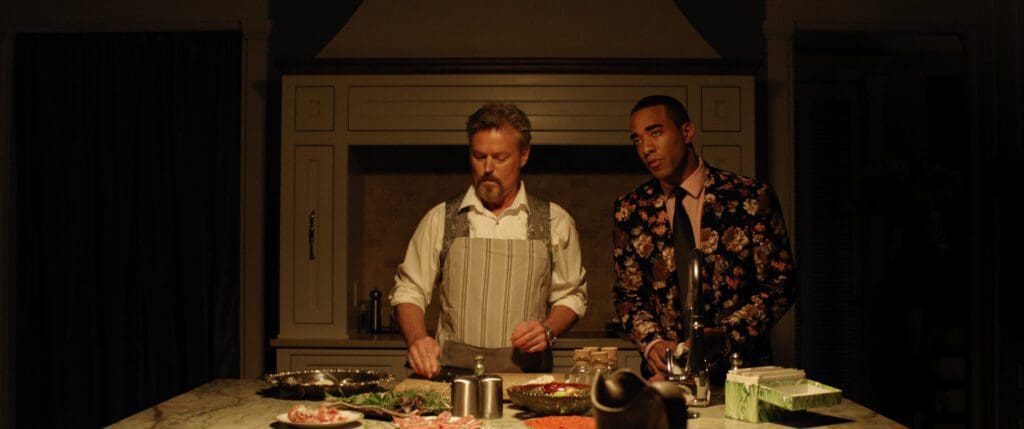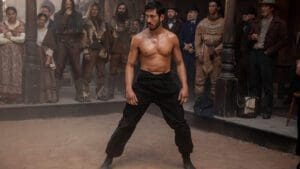Summary
A black comedy horror about a couple hoping for patronage from the wealthy elite, written and directed by Miles Doleac.
I didn’t know what to expect when I sat down to The Dinner Party – it could have been something wordy like The Party or something sinister like The Invitation – but the opening pre-credits clip told me to expect blood. Why, how, and whodunit were yet to follow, and I’ll do my best not to give those away.
The scenario is this: Jeffrey and Haley Duncan are invited to a secret dinner by a wealthy patron of the arts, where they hope to be introduced to “the cream of the crop” and get Jeffrey’s latest play funded. The host and his friends have a different agenda, though.
The Dinner Party is a black comedy horror with overtones of Society in its commentary about the elite and those who suck up to them, but with less riotous humor, and a slower pace to suggest more sophistication. The set (especially the beautifully laid table) and the costumes are sumptuous, complemented by extravagant paintings and an ornate gramophone player. It’s very clear that Jeffrey (Mike Mayhall) and Haley (Alli Hart) are out of their league; they are treated like ignorant plebs from the start, even made to wait in an anteroom before dinner, rather than brought to mingle with the others until it starts.
The “elite” set is made up of host Carmine (Bill Sage), mischievous Sebastian (Sawandi Wilson), lusty Agatha (Kamille McCuin), coarse Vincent (Miles Doleac, also the writer/director) and the annoyingly ethereal Sadie (Lindsay Anne Williams, who also looked after the casting and the costumes). Quite a cast, who gave the film the elegant presence it required. Elegance is what The Dinner Party is about, after all, as though the way one class of people dress or talk sets them above others. Unfortunately, the best of the cast, Bill Sage, is underused (he may have had more presence among smaller numbers), and the majority of the others show mediocre acting talent (Lindsay Anne Williams pulled me right out of the film with every line). Fortunately, though, the one who has the most range to play does it well: Alli Hart, who I have not seen before: she is the controlled, girlish wife, with surface fragility hiding some latent power; I don’t want to compare her to Samara Weaving from Ready or Not, but – like others – can’t help it.

The flamboyance of The Dinner Party is entertaining to watch, for sure, but there is little real suspense. It was amusing in parts, and generally a very well made film, but I’m sorry to say I didn’t enjoy The Dinner Party much. The party itself – when it finally starts – is so dull that I would have been restless if I was there (as I’m sure Jeff was, as they didn’t talk about his play at all). The talk of opera and overdone dishing out of tarot cards was pretentious, rather than elegant or atmospheric. If those aspects had been truncated in favor of more exploration of the smaller themes that were hinted at (our individual history, for example), the film could have been much more interesting and could have moved along with a more engaging pace.
There were two particular scenes which did not work for me: firstly when the Sheriff’s car just happens to be waiting outside; and secondly when lesbianism is casually described as unnatural and sinful as… well, something I’m not going to write here. The latter, I’m sure, was part of the satire; but to me, it was simply distasteful.
I enjoyed Clifton Hyde’s music, which almost compensated for the poor acting once the story got going; the reveal behind the party’s agenda was a surprise; and in general, The Dinner Party was beautifully made. But otherwise, it is not a film I would recommend.



